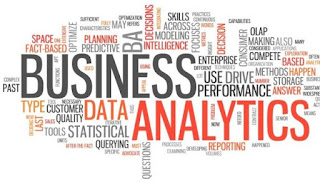Data Analytics - The Next Big Career Option for Engineers
In today’s cut-throat competition, it is increasingly
becoming important for organizations to continuously up their business performance,
stay abreast of the latest industry happenings, respond quickly to emerging
market trends and innovate ways to enhance their productivity if they want to
sustain themselves and remain profitable in the competitive business world. One
of the leading ways for organizations to stay ahead of the curve is to harness seemingly
unfathomable Big Data in order to uncover hidden trends, patterns and
correlations that can be used to draw logical conclusions which, in turn, can enable
companies to make informed business decisions and help them improve and
optimize their revenues, operational efficiency, regulatory compliance,
marketing strategies and customer service initiatives.
What is Data Analytics?
Also known as Data Analysis, Data
Analytics is a vast domain that focuses on the transformation of humongous
data sets into meaningful information that can be used to drive strategic
business decisions and actions. The elaborate process leverages exploratory
data analysis (EDA) and confirmatory data analysis (CDA) along with a host of
qualitative and quantitative techniques to analyse, profile, cleanse, transform
and model data with the aid of specialized systems and analytics software,
including statistical & predictive modelling tools, machine learning
algorithms and Python Scikit Learn /Scala/R/SQL/SAS
programming languages.
Extensively used in B2C companies, the rapidly developing
and broad field emphasizes on the study of a variety of data that is oriented
to customers, business processes, market economics etc. Both historical and real-time
data are extracted and categorised to unearth and analyse behavioural data that
sheds light upon trends associated with human interactions such as customer
preferences, spend & usage patterns, community interests etc. Data related
to business processes and market economics are also examined to identify purchasing
patterns and to align one’s business strategies and priorities according to these
trends.
Why is Data Analytics a Desirable Career for Engineers?
As an Engineer, Data
Analytics
can be a path-breaking career move for you as it is one of the most sought
after, high paying and fastest growing fields in the world today with a steady
increase in the number of job opportunities that prevail in this domain. Depending
upon your aptitude and interest, you can choose to venture into Big Data
Analytics or Big Data Engineering. While the
former requires you to facilitate the process of data analysis by extracting
large amounts of structured and unstructured data from different source systems
followed with their integration, assembling, cleansing and subsequent
structuring into common data set formats that can be loaded into individual
analytics applications, the latter entails the design and deployment of systems
that can make the prepared data sets readily available for various analysis purposes
and for use in internal applications.
According to Srikanth Velamakanni, Group Chief Executive of Fractal
Analytics - India’s second largest analytics firm, the analytics market is
poised for phenomenal growth in the upcoming years and will evolve to at least
one-third of the global IT market from the current one-tenth. In another study
by the McKinsey Global Institute, it has been estimated that by 2018, the US
alone will be short of approximately 190,000 data scientists and 1.5 million
managers and analysts who have the ability to decode and utilize Big Data to
aid the decision-making process of their organizations.
With the demand for skilled data analysts far surpassing the
availability of trained professionals, there is always a dearth of qualified
Data Engineers and Data Analysts who can assist businesses in exploiting Big
Data to their advantage. A career in this exciting field can imply immense job
satisfaction for Engineers as their Big Data solutions have the potential to
exhibit a far-reaching impact on an organization’s overall business goals and
objectives and in addressing real world business problems. The ability to wear
many hats such as those of a Data Analyst, Data Scientist, Big Data Engineer,
Business Intelligence Officer etc. and the added advantage of being able to earn
handsomely and gain enterprise-level exposure during one’s day-to-day
interactions with various business units, departments and functions further add
up to make data analytics a dream career
path for Engineers. As Jeanne Harris, former Global Managing Director of
Information Technology Research at the Accenture Institute for High Performance
in Chicago aptly sums its relevance saying, “Data is useless without the skill
to analyze it.”



Comments
Post a Comment